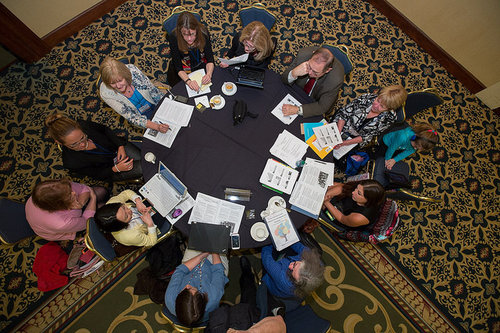Using Negotiation and Consensus Building in Early Childhood Education


“The view that education is limited to schooling alone is hindering the progress in achieving the purpose of education,” Dr. Esther Oduolowu, Professor of Early Childhood Education at the University of Ibadan in Nigeria, says. “Diplomacy tools—persuasion, dialogue, shaping consensus, etc.—are useful strategies to re-align the view of education as a lifelong and [longterm] process.” Using Education Diplomacy, Dr. Oduolowu has supported the ongoing education of African leaders in early childhood education and development (ECD), filling a leadership gap in a crucial area of education.
Dr. Oduolowu spearheaded the web-based Early Childhood Education Postgraduate Diploma Programme, a partnership between the University of Victoria, Canada, and the University of Ibadan, Nigeria. This Early Childhood Development (ECD) leadership initiative focuses on enhancing ECD efforts and promoting African Regional ECD capacity building. Internationally recognized and accredited, it is an innovative virtual program designed to address Africa’s ECD leadership needs.
In 2011, after graduating from the University of Victoria’s ECD leadership postgraduate diploma program, Dr. Oduolowu recognized a gap in ECD leadership in Nigeria that was “inhibiting the progress of ECD.” In addition to the insufficient number of trained ECD caregivers, given the need with over 22 million children, Dr. Oduolowu noted the “dearth of manpower at higher level government for the implementation and monitoring” of ECD. The Early Childhood Development Virtual University Programme addresses this problem by “building ECD leadership capacity through promoting African Regional ECD network, supporting in-country development of ECD leaders, [and] utilizing technology and indigenous knowledge to stimulate local solutions to ECD problems.” This led to the collaboration effort between the University of Idiban, Nigeria and the University of Victoria, Canada to base the program in the University of Idaban to meet this need in Nigeria and in Africa as a whole.
The fifth cohort of the ECD Virtual University Programme included 28 Nigerian participants, representing 22 of Nigeria’s 36 states, and seven participants from five other African countries. In Nigeria, the first cohort of 22 participants has been involved in reshaping the ECD program in the country. They have been increasing the number of ECD caregivers at the grassroots through training and retraining. This has not only increased the number of ECD caregivers ut has equipped those on the job with the relevant skills to function effectively. Dr. Oduolowu shared that the cohort has been “able to influence the government’s decision to increase annual budgetary allocation from 2% to 5%.”
Dr. Oduolowu credits Education Diplomacy for this achievement. Education Diplomacy uses the skills of diplomacy to bridge divides between sectors, diverse actors, and borders to address education challenges and move transformative education agendas forward. The practice of Education Diplomacy supports interactions that cultivate partnerships, create shared value, and shape consensus about mutually beneficial solutions that position education as a force for positive change in the world.
Contributions and cooperation from many sectors and actors were needed to implement this program in Nigeria. The first step was establishing a partnership between the University of Ibadan, the host institution, and the University of Victoria. Engaging the University of Ibadan required “a lot of persuasion and open-mindedness and listening to get the support of scholars from the Department, College, Postgraduate school and University levels to get the proposal approved.” Once the proposal was approved at the university level, Dr. Oduolowu leveraged these relationships to involve the Nigeria Federal Ministry of Education and the Universal Basic Education Commission (UBEC) to nominate participants from all the states of the country and sponsor the nominees. Sponsored nominees were given permission to participate in the program while on their jobs and received the technology tools needed to access the online program. The Nigerian government agreed to meet with the University of Ibadan team and other stakeholders, including Dr. Alan Pence of the University of Victoria, UNICEF Nigeria, the World Bank, and others. As Dr. Oduolowu recounts,
“At the round-table meeting, a lot of persuasive arguments were put forward to convince the government about the efficacy and benefits of the program to the children, the government, and the society as a whole. In the process of negotiation, respect, compromise, give and take, and concession, diplomacy skills were utilized in securing the government’s financial commitment and the university willingness to compromise its admission process by agreeing to register the cohort as a group and even succumb to some waivers in favor of the nominees. Eventually, the government’s commitment was secured and 28 participants were nominated to access the program.”
Diplomacy skills of leveraging were key to securing the necessary mutual agreement to implement the ECD leadership program, which advanced both the education of government leaders and the education of children in their early childhood years. In addition to consensus building, which brought colleagues together to shape the proposal, negotiation skills in particular “dominated the process,” Dr. Oduolowu says. “It started with mediation to persuade colleagues to work together and extended to [a] higher level of persuasion for the University to approve the program. The “win-win” approach at the end of meeting with government officials was achieved as a result of mutual trust and mutual agreement. This is diplomacy skills at work.”
By developing and implementing this program, Dr. Oduolowu used Education Diplomacy to help develop new leaders in the ECD field who can also use Education Diplomacy to help advance education for children in their own communities. Dr. Oduolowu continues to use her Education Diplomacy skills at the University of Ibadan as well as in her other initiatives. She played a leadership role in the development of the Indigenous Early Childhood Care and Development Curriculum for disadvantaged and hard to reach children in Africa. She also serves as one of the Country Liaisons for Nigeria for the Association for Childhood Education International.